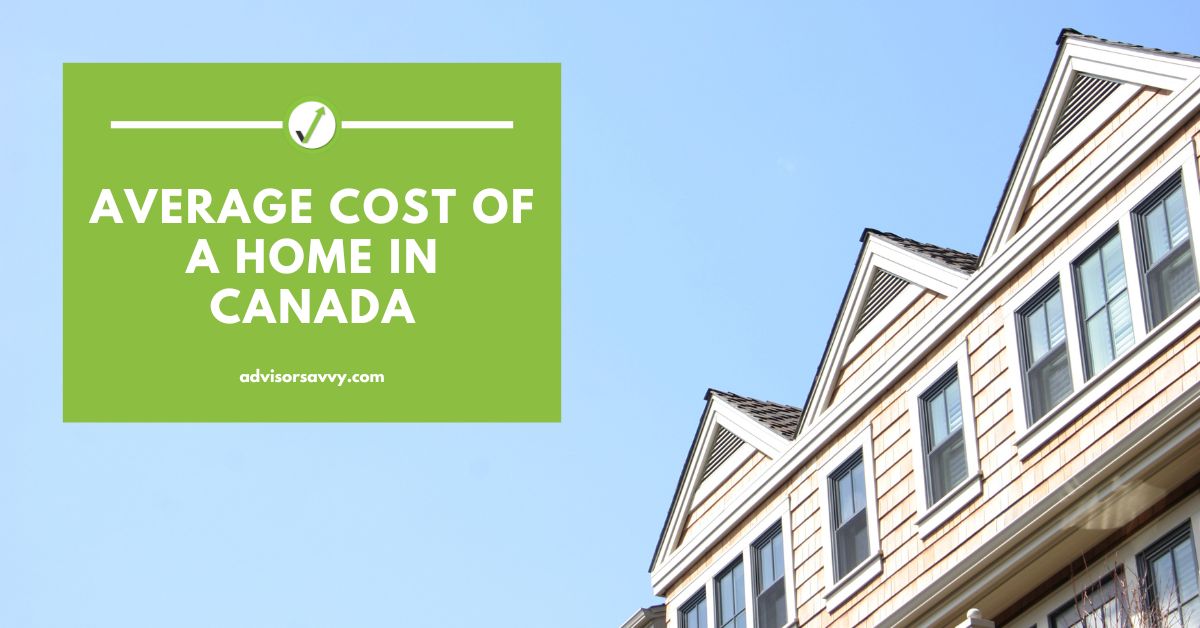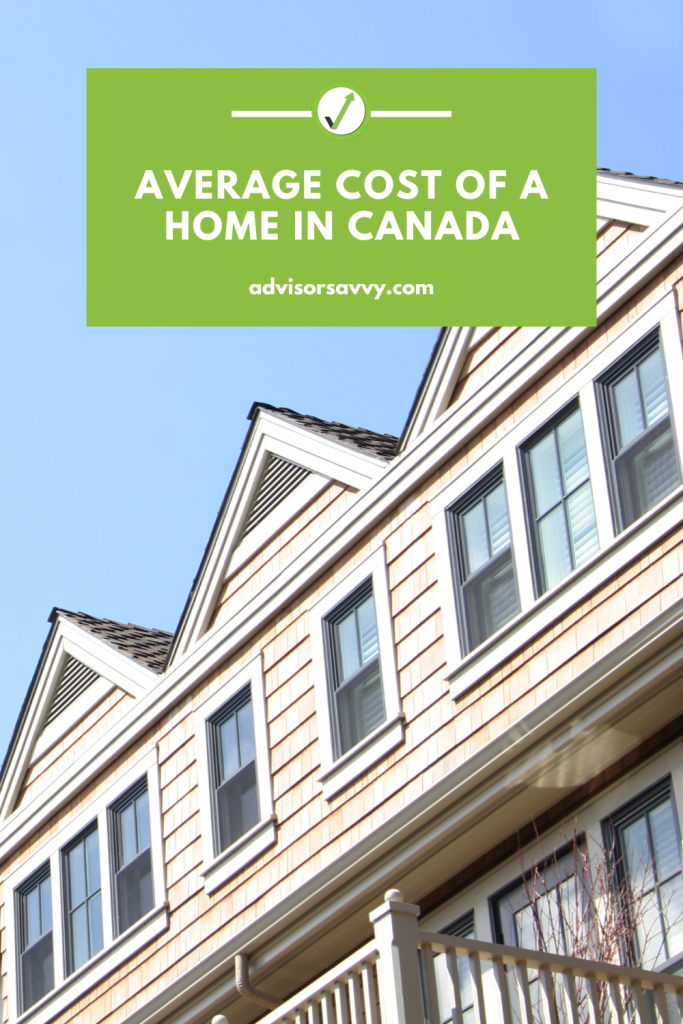
Many Canadians agree the cost of living in Canada is expensive. This is true if you rent or own your home. However, owning a home and putting money towards a mortgage is generally favorable because you can establish and build generational wealth that way. The question becomes, what is the average cost of a home in Canada? We will answer this question in the article below, including highlighting all costs involved in home ownership and other characteristics of the Canadian housing market.

Table of contents
- What is the average price of a house in Canada 2023?
- Who can afford a house in Canada?
- Why is Canadian real estate so expensive?
- Why are homes unaffordable in Canada?
- What is the most expensive city to buy a house in Canada?
- How much does it cost to live in Canada annually?
- How much do people spend per month in Canada?
- Which province has the highest poverty rate in Canada?
- Will housing prices drop in 2023 in Canada?
- What is considered wealthy in Canada?
- Are houses in Canada expensive?
What is the average price of a house in Canada 2023?
As of March 2023, the average cost of a home in Canada was $686,371, according to the Canadian Real Estate Association. This is down 13.7% since last year. Below are the averages by province and territory:
| Province/Territory | Average Cost of Home | % Change Since Prior Year |
|---|---|---|
| British Columbia | $960,067 | -11.7% |
| Alberta | $446,263 | -4.6% |
| Saskatchewan | $321,400 | -0.6% |
| Manitoba | $338,022 | -11.2% |
| Ontario | $881,946 | -16.4% |
| Quebec | $471,460 | -3.6% |
| New Brunswick | $270,900 | -3.5% |
| Nova Scotia | $376,600 | -4.7% |
| Prince Edward Island | $334,900 | -0.8% |
| Newfoundland & Labrador | $272,600 | 2.8% |
| Yukon | $519,190 | -3.5% |
| North West Territories | $422,787 | 17.6% |
| Nunavut * | $706,950 | N/A |
You’ll notice from the data above that home prices have gone down since the previous year in all provinces and territories, except for Newfoundland and Labrador and the North West Territories. Falling home prices is likely due to cooling inflation and rising interest rates.
Other costs to consider
Unfortunately, home purchases are not just about the mortgage payment and average cost of a home in Canada. There are other costs to consider that affect home affordability. Let’s take a look at each below and what the current average cost is by province and territory. Note that the below property tax amounts are rough estimates based on popular cities.
| Province/Territory | Average Annual Property Taxes | Average Monthly Utilities |
|---|---|---|
| British Columbia | $4,335.25 | $296 |
| Alberta | $3,890.06 | $362.50 |
| Saskatchewan | $3,117.69 | $381 |
| Manitoba | $4,220.92 | $275 |
| Ontario | $9,141.28 | $320 |
| Quebec | $3,877.78 | $325.50 |
| New Brunswick | $4,342.66 | $284 |
| Nova Scotia | $4,174.61 | $361 |
| Prince Edward Island | $2,243.83 | $357 |
| Newfoundland & Labrador | $1,989.98 | $203 |
| Yukon | $5,586.48 | $254 |
| North West Territories | N/A | $387 |
| Nunavut | N/A | N/A |
If you choose to live in a condo over a house, remember to consider the cost of monthly condo fees. In addition, you should keep an emergency fund to handle unexpected costs related to your home, such as a flooded basement or leaky roof. Some also choose to insure their home and it’s contents through home insurance, which is another cost to take into account.
Who can afford a house in Canada?
Home affordability in Canada is a hotly debated topic, particularly in recent years. Some might even suggest there’s an impending housing crisis. So who can afford a house in Canada? Ultimately, it all boils down to how much you earn, the cost of the property in question and your other living expenses.
The Canada Revenue Agency advises you spend no more than 35% of your gross income on household related costs. In other words, your mortgage payment shouldn’t be more than 35% of your monthly or annual pre-tax income. Before entering into a mortgage and buying a home, you should consider this ratio. Remember, a home’s affordability isn’t just about the mortgage payment. Be sure to factor in other costs like your property taxes and a buffer for unexpected repairs.
Still looking for more guidance? Checkout this mortgage affordability calculator.

Match to your perfect advisor now.
Getting started is easy, fast and free.
Where is housing cheapest in Canada?
At the time of writing, housing is cheapest in Canada in the province of New Brunswick. However, that is considering to buy a home, not rent.
Related Reading: How to Move to Canada
Why is Canadian real estate so expensive?
There are a few reasons why Canadian real estate is so expensive and the average cost of homes in Canada are high. As with most things, the problem isn’t caused by one single issue. Let’s explore the ins and outs of the real estate market in Canada below.
Why are homes unaffordable in Canada?
Here are the main factors affecting the affordability of homes in Canada:
- Foreign buyers. For over a decade, foreigners have been purchasing real estate in Canada as an investment vehicle. This has reduced the real estate available to local Canadians. When supply is reduced, the price rises. Thankfully, as of January 1, 2023, foreigners can no longer buy real estate in Canada. You must be a resident or citizen of Canada to purchase property. In addition, those who do not occupy their homes for longer than 6 months in a year will be charged vacant home tax.
- Short term rentals. The disruptive technology, Airbnb, has increased the demand for short term rentals. Airbnb and other similar platforms are desirable and popular, but the downside is less long term rentals being available in the market. This also means a lot of real estate is being bought up for the purpose of short term rentals, leaving fewer homes for Canadians. Again, when the supply is low, the price rises.
- High interest rates. In 2021 and 2022, Canada experienced lower interest rates than usual. This means it was cheaper for Canadians to take out and carry debt. As a result, more people entered the housing market. When demand is high and supply is low, prices rise. Fortunately, cooling inflation and rising interest rates appears to be combating home prices.
What is the most expensive city to buy a house in Canada?
At the time of writing, housing is most expensive in Canada in the province of British Columbia. However, that is considering to buy a home, not rent.
Related Reading: Buying a House in Canada: Financial Considerations
How much does it cost to live in Canada annually?
According to Numbeo, the average annual cost of living in Canada is $15,350.40 for a single person without rent or a mortgage. For a family of four, the average annual cost of living in Canada is $54,598.80 without rent or a mortgage. These costs capture living expenses like food, entertainment, transportation, childcare, and clothing.
How much do people spend per month in Canada?
On a monthly basis, single person households spend around $1,280 on average. As for a family of four, the monthly average cost is closer to $4,550.
Which province has the highest poverty rate in Canada?
According to the 2021 Statistics Canada Report, the highest poverty rate is in Vancouver at 11.2%. This makes British Columbia the province with the highest poverty rate.
Following behind Vancouver is Halifax at 10.5% and Toronto at 10%. The regions with the lowest poverty rates in Canada include Quebec at 4.8%, Saguenay at 5.3% and Oshawa at 5.3%. Although keep in mind this data was collected in 2020. It is possible the situation is much different now, in 2023. This is especially true considering the dynamic housing market and radical changes to our economy echoing the COVID-19 pandemic.
Will housing prices drop in 2023 in Canada?
Many expect house prices in Canada to drop in 2023, which we’re already seeing as of March. However, experts predict housing prices will continue to drop throughout the year. Much of this is attributable to rising interest rates and cooling inflation.
Ultimately, no one truly knows what will happen in any given housing market until it happens. Canadians will have to wait and see what occurs during the year! For existing homeowners, a drop in house prices is unfavorable because it reduces their overall wealth. However, fluctuations in real estate are almost always temporary. So long as you can pay your mortgage and other costs associated with the home, it’s best to hang onto the asset and weather the storm. On the other hand, for those who are not yet homeowners, it may be an opportunity to enter the market.
What is considered wealthy in Canada?
If you have a net worth of $1 million or more in Canada, you are considered wealthy. It is estimated there are approximately 1.7 million millionaires in Canada. Compared against the total population of 39 million, about 4% of the country is considered wealthy.
Owning real estate is generally the easiest way to establish and build generational wealth in Canada. For this reason, many are motivated to enter the housing market, but there are financial challenges along the way. As mentioned above, with falling home prices, it may be an opportunity for Canadians to enter the market.
Are houses in Canada expensive?
Yes, houses in Canada are expensive. This is especially true for younger generations, such as Millennials and Generation Z. However, much of this is attributable to recent economic instability and trends from the 2010s that we’re feeling the effects of now. The Canadian government has implemented certain changes which will hopefully cool the market, such as vacant home tax and interest rate hikes.
Are you struggling to enter the Canadian housing market? A financial advisor can help you prepare for your first home purchase. Fill out this questionnaire to find your match today!
Read More: Best Places to Retire in Canada and Why
